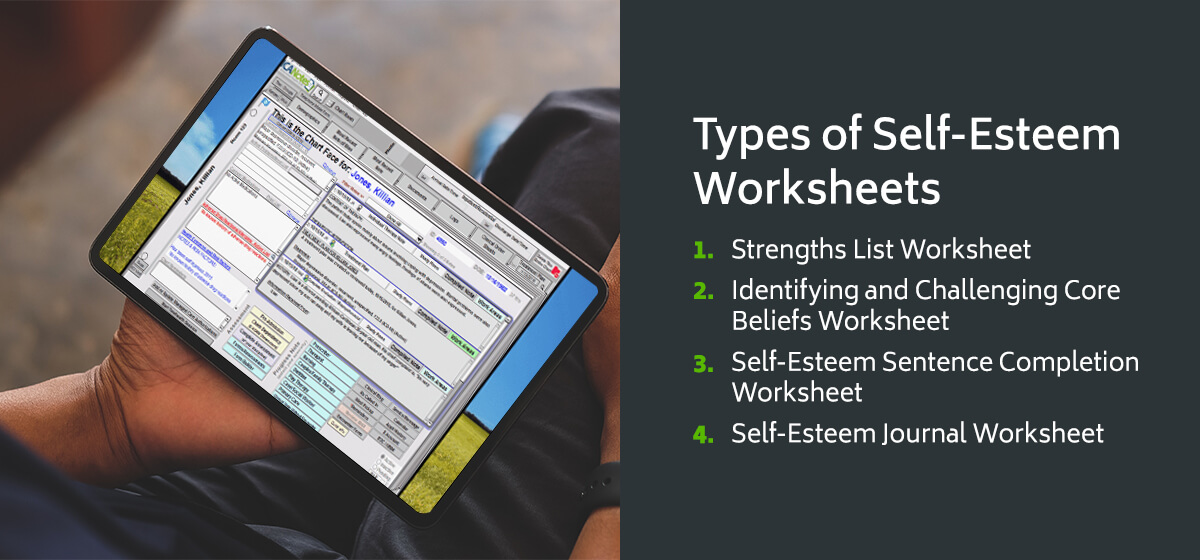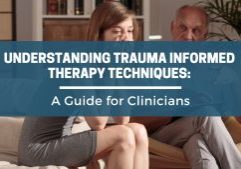Self-Esteem Worksheets

As a therapist or behavioral healthcare clinician, you may counsel many patients with low self-esteem or self-confidence. Patients with depression or anxiety are found to have the lowest self-esteem, which means certain mental health conditions or disorders may be a significant factor in the negative thoughts or feelings one may have about themself.
Individuals with low self-esteem may have frequent negative beliefs about their appearance, abilities, talents and skill, or general purpose as human beings. Those with low self-esteem often view these beliefs as facts rather than opinions, which can alter the way they act and behave in their relationships. Through therapy, your patient can begin to restructure their way of thinking and build up confidence in themselves.
Building Self-Esteem
Low self-esteem is often caused by different forms of bullying, abuse and trauma and can lead patients to avoid participating in life activities, including their relationships, careers and social outings. This avoidance may stem from a fear of experiencing suffering, criticism or discomfort, causing your patient to take few risks and emphasize their weaknesses as an excuse to disengage. Therapy for self-esteem aims to help clients recognize negative thoughts and behavior patterns, such as self-criticism, and reframe these patterns into more compassionate and uplifting forms of self-talk.
By working with your patient, you can help them discover new strengths, highlight things they like about themselves and set healthy and achievable long-term goals. Certain self-esteem activities can also give your client the tools they need to practice mindfulness, an essential component of many behavioral health practices.
The end goal is to make your patient feel more capable and deserving and increase their sense of worth. You can build your client's self-esteem in a few different ways. Here are three activities that build self-esteem:
- Recognize the "shoulds": Your patient may believe in many "shoulds" regarding who they are and what they do, leading them to have unrealistic expectations of themselves. Feeling trapped by such opinions can damage their self-worth and esteem, so it's important to recognize the "shoulds" that they carry with them.
- Challenge the "shoulds": Once your patient learns to recognize their "shoulds," it's time to challenge them. Encourage your patient to learn why the "should" arose in the first place and determine the impact it's had on their life. Ask them to weigh the pros and cons of having this "should" hanging over them.
- Improve awareness: To gain a more realistic sense of self-esteem, ask your client to reflect on their actions and decisions. Help your patient examine their past experience and learn to accept that errors are critical to the learning process. The more aware they are of potential risks or consequences of their actions, the less it may damage their self-esteem.

Types of Self-Esteem Worksheets
Every patient is different, meaning their self-esteem challenges will also be different. Building up your patient's self-esteem will vary depending on many factors, such as their age, past experiences and whether they suffer from a mental health disorder. Here are four free self-esteem exercises you can create for your patient to keep in their records.
1. Strengths List Worksheet
With a strengths exploration worksheet, you can help your client recognize their strengths and learn how to use them in daily life. During your session, have your client write out a list of what they consider to be a strength within themselves.
You can adapt this worksheet as needed, such as leaving 10 blank spots for them to fill in or creating a list of traits and telling them to circle the ones they think apply to them. This worksheet is a simple way for your client to reflect on themselves and begin to emphasize their strengths more than their weaknesses.
Once your client finishes, have a discussion about the worksheet and determine what circumstances or situations they might use their strengths in. For example, if they write or circle that one of their strong traits is being a good listener, help them see how they can use that strength to become more confident. If your client struggles to list or circle 10 strengths, work together and build up to it in each session.
2. Identifying and Challenging Core Beliefs Worksheet
To encourage your client to challenge their negative inner thoughts, try using this effective worksheet to help them discover, identify and challenge their core beliefs. At the top of the worksheet, provide an overview of what a core belief is and how it can impact the way your client views themselves, others and the world around them. Next, create several example interactions and give your client options to select how they would react in that situation. Here's an example:
You are preparing for a job interview for a position that you really want. Which core belief best represents your instant internal thoughts about this situation:
- I'm qualified and have the experience and skill to land this dream role.
- I think I'm good, but I don't think I will get the job.
- I am not good or deserving enough for this job. Another candidate will be much more capable than me.
Finish by having your patient reflect on their negative core beliefs. Ask them to come up with three reasons why each negative belief about themself is untrue.
3. Self-Esteem Sentence Completion Worksheet
This is a simple fill-in-the-blank exercise. The worksheet enables your patients to explore their thoughts and feelings about themselves and encourages them to open up and get more comfortable building up their self-esteem.
You can conduct this worksheet as a one-time exercise in one session or have your patient complete it again after some time has passed. Filling out the worksheet twice allows you and your patient to review and compare responses to see what has changed. The intended goal is for the answers on the second worksheet to be more confident or positive.
Here are some examples of sentence stems you can use:
- I have always wanted to:
- I think I am:
- It makes me feel happy when:
- I look forward to:
- I'm fearful of:
- My strength comes from:
- This week is going to be:
- My day is better when:
- Something I deeply desire is:
- I find it difficult to:
- I sometimes feel:
4. Self-Esteem Journal Worksheet
This self-esteem journal worksheet can be used throughout multiple therapy sessions as an ongoing way to promote positive self-reflection. This worksheet is similar to keeping a gratitude journal and aims to help your patient recognize and appreciate the things about themselves that they like or things in their lives that are going well. Journaling is a therapeutic exercise that often provides cathartic relief for patients struggling to understand themselves and what they're going through.
In this worksheet, create three to five categories with various open-ended prompts. This exercise is similar to the sentence completion worksheet, except the responses should be longer. Encourage your patient to write as much as they want for each prompt. Here are some examples of categories to include:
- Family
- Friends
- Career
- Self-love
- Relationships
- Success
- Hobbies
Here are examples of prompts to include within those categories:
- Three people I feel thankful for include:
- My spouse or significant other helps me:
- I feel successful when:
- Five things that made me happy this week are:
- Two small wins I had today were:
- My friends support me by:
- I get excited for:
- I feel my best self when:
- Four things I do to take care of myself are:
- One thing I love about my job is:
While you can decide on any categories or prompts that apply to your client's situation, they should purposefully provoke positive responses. This intentionally sets your client up to focus on the good things in their life. You can use this journaling exercise as a quick way to boost your patient's mood or have them complete it on a weekly basis to facilitate positive self-esteem development.
Explore Self-Esteem Worksheets Today!
Building your patient's self-esteem is an effective way to get them on track to living a healthier, engaged lifestyle. Using these self-esteem worksheets, you and your patient can reflect and collaborate on ways to minimize negative self-talk and promote confidence. At ICANotes, we provide a robust, intuitive EHR charting solution for all your behavioral health needs. From reducing documentation time and organizing your progress notes to keeping track of your patient's treatment plan, it's our goal to help you provide better care.
Our sample notes and assessment tools help therapists like you create thorough, accurate documentation for your patient and easily access your notes before each session. If you want to learn how our features and resources can help you build your patient's self-esteem, contact us today or request a free trial to get started.











